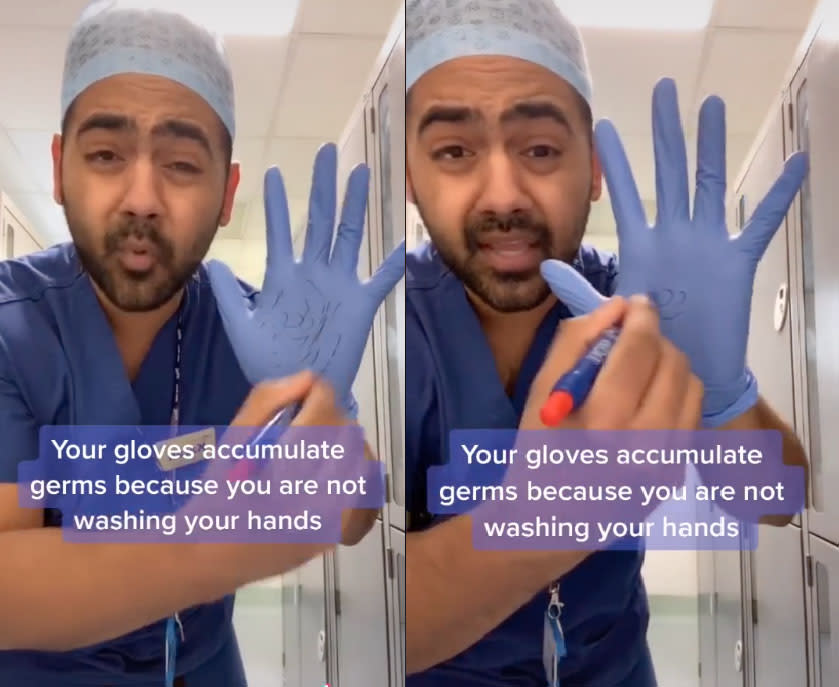Coronavirus: Doctor's shocking protective gloves video goes viral
A doctor has taken to popular social media platform TikTok to debunk a common misconception around the coronavirus protective gear.
While people are urged to try and wear masks, many think that opting for gloves is also a good decision, however medical professionals have repeatedly warned against them, as this UK doctor took to TikTok to highlight.

warns his followers that gloves can easily become contaminated, in an engaging video that has attracted thousands of likes and comments.
Dr Raj explains that when out and about, gloves could end up “more full of germs than your hand would have been” if you washed them regularly.
The popular doctor shows how touching various objects with unwashed gloves accumulates far more contact germs. He uses a sharpie pen to represent ‘germs’ picked up.
He goes on to warn people that they may mistakenly touch their face with a contaminated gloved hand, undoing the entire purpose of the gloves in the first place.

“Just wash your hands, be sensible, stay safe,” he urges his 1.5 million followers.
He’s not a lone voice on the matter, with medical professionals and officials warning against using gloves for everyday protection from the beginning of the pandemic.
Officials agree gloves no substitute for washing hands
Research suggests the coronavirus may survive on surfaces for several days - this includes things like door knobs, hand railings, and cutlery handled by others.
Although the coronavirus is known to spread via coughs and sneezes, initially little was understood about whether the virus “lurks” in the air or on surfaces.
Now it’s become clear it can be both, which is why washing your hands regularly has become one of the best defences against getting it.
People could therefore mistakenly contaminate their gloved hands when they touch these surfaces, with the lack of sanitisation meaning the plastic is virtually useless, particularly if a stray itch or loose hair brings your gloved hand up to your face where any germs it’s holding will be transferred to your most vulnerable area.
Dr Amesh Adalja from Johns Hopkins University made this very clear earlier this year where he said that unless people manage to not touch their faces gloves are ineffective.
“If people cannot stop touching their face, gloves will not serve a purpose,” Dr Adalja said.
A 2015 study in the American Journal of Infection Control found people touch their face on average 20 times an hour.
So instead of opting for gloves, officials are urging the public to wash their hands regularly.
“Gloves are not a substitute for washing your hands,” said Dr Adalja.
French health minister Olivier Veran has also spoken out on the issue, saying: “If you're wearing gloves, you're not washing your hands.”
Research suggests gloves are effective in clinical settings, like hospitals.
This may be because doctors theoretically throw them away after every use, with the buildings also being disinfected regularly.
“There is little evidence to support the use of gloves outside of the clinical setting (e.g. treating a patient) to prevent becoming infected”, Dr Tom Wingfield from the Liverpool School of Tropical Medicine previously said.
Coronavirus in Australia
In Australia, a fresh wave of cases of the coronavirus has seen a second lockdown implemented in Victoria and new cases springing up in NSW.
Authorities continue to struggle to get a grip on Victoria’s crisis as the state is expected to announce yet another daily record for cases, edging close to an unprecedented 500 infections.
In the past nine days, NSW has recorded more than 10 locally acquired cases per day.
The state has not seen similar levels of infection for more than three months.
With additional reporting by Alexandra Thompson.
Sign up to our daily newsletter here to get all the latest news and hacks. Or get in touch at lifestyle.tips@verizonmedia.com.





